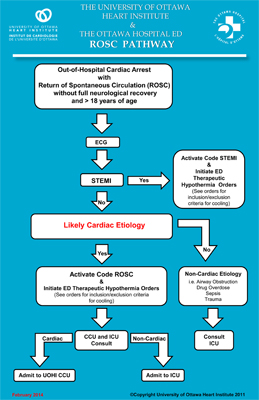Out-of-hospital cardiac arrest (OHCA) is a medical emergency which is associated with an extremely high incidence of death.1 Moreover, neurological damage is often found to be a prevalent, enduring consequence resulting in significant loss of function and quality of life in these patients.2 In an effort to improve both the survival rate and neurological outcome of OHCA patients, the University of Ottawa Heart Institute (UOHI) developed a standardized multidisciplinary Cardiac Arrest Program which includes the Code ROSC (return of spontaneous circulation) pathway. This pathway was initiated in September 2011 in collaboration with The Ottawa Hospital.

The Code ROSC pathway is designed to improve care for OHCA patients through rapid response and assessment, effective health care delivery, rapid initiation of therapeutic hypothermia and access to emergency angioplasty when deemed appropriate. The Cardiac Arrest Program, by way of the Code ROSC pathway, employs a dual consult strategy between Intensive Care and Cardiology disciplines.
This approach ensures that OHCA patients are admitted to a suitable unit for management and receive the most appropriate medical treatment. As part of the cardiac arrest treatment plan, the Heart Institute performs a coronary angiogram on each patient to try to immediately determine the cause of the arrest and initiate revascularization when appropriate. This strategy is applied in conjunction with cooling, a crucial element to an OHCA patient’s treatment. The preferred mode of cooling in the UOHI Coronary Care Unit is endovascular. This rapid mode of cooling offers a high degree of accuracy and allows for easy assessment of the OHCA patient by the treating medical team.
Since 2011, the Cardiac Arrest Program has grown to encompass the hospitals of the Champlain Local Health Integrated Network (LHIN). These hospitals routinely transfer OHCA patients to the Heart Institute for management and further treatment. The Institute admits approximately 80 OHCA patients per year from the Champlain LHIN. Since the launch of the program and the implementation of novel medical practices, OHCA patient outcomes have significantly improved. In addition, the standardized multidisciplinary approach of the Cardiac Arrest Program has allowed for many research projects to be conducted and published in major scientific journals. The program has also provided a platform to support a randomized controlled therapeutic hypothermia trial which began in 2013.
The Heart Institute remains dedicated to achieving prevention methods and advanced treatments of heart disease. The Cardiac Arrest Program continues to build knowledge through research and translate these discoveries into tomorrow’s advanced care for cardiac arrest patients.
Michel Le May, MD, would like to acknowledge, on behalf of the Cardiac Arrest Program, the physicians, nurses and support staff of the University of Ottawa Heart Institute, the Ottawa Hospital, the Champlain LHIN Emergency Departments and the Emergency Management Services for their dedication and continuous participation in the program. Their ongoing commitment has made this program a realization and a great success.
References
- The HACA Study Group. Mild Therapeutic hypothermia to improve the neurologic outcome after cardiac arrest. NEJM 2002; 346: 8: 549-556
- Merchant et al. Cost-effectiveness of therapeutic hypothermia after cardiac arrest. Circ Cardiovasc Qual Outcomes. 2009; 2: 5: 421-8

